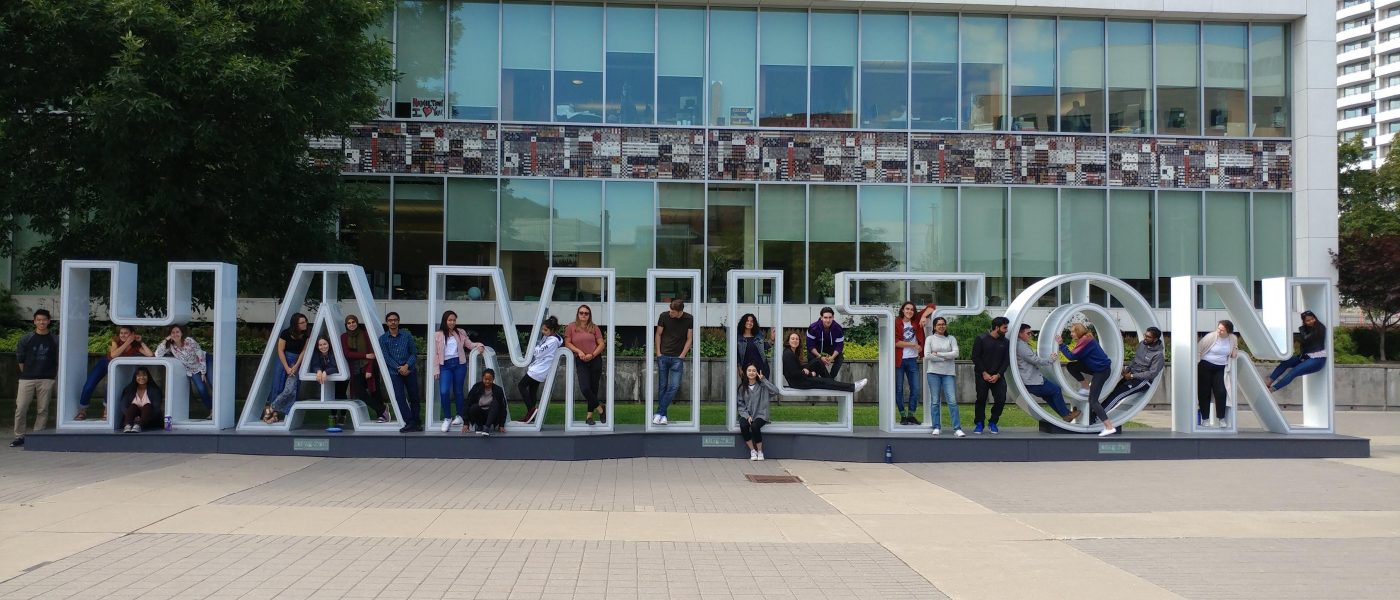Overview
Offered each fall semester, CityLAB Semester in Residence is a 15-unit course designed for passionate, motivated, and enthusiastic students. If you want to learn from the community, apply your studies to make change, and expand your personal and professional networks, then this is the course for you!
Students and staff from the City of Hamilton co-create and design an innovative real-world project to address the problem, gaining valuable insight and data that can be shared and potentially scaled up. Students attend class daily at CityLAB’s co-working space located next to City Hall, providing students with the opportunity to truly immerse themselves in the City of Hamilton. Students in any faculty from McMaster are welcome to apply.
Information Box Group
Fall 2024 SIR Theme: Climate Change
Each year within the CityLAB SIR program we aim to bring projects into the fold that relate to a broad theme that will help us explore our city and community together through a dynamic, fun, experiential, and innovative curriculum that will see students contributing ideas to challenges we’re facing now and into the future. This year our theme—How might we build a climate resilient future?—asks us to bring a critical lens to our explorations, discussions, and project work. Throughout CityLAB SIR, we will explore what this question means to the future of the City of Hamilton. Developed in alignment with the City of Hamilton’s new climate mitigation and adaptation strategies, the semester will see students working alongside leaders within the City of Hamilton and the Hamilton community to think critically about what a climate resilient future might look like in Hamilton. Interacting with experts from a range of sectors to glean systems-wide insights on how climate change is impacting our communities and the world at large, the program will see students working in interdisciplinary teams that co-create and test concepts and ideas with residents, community organizations, and City of Hamilton staff through collaborative dialogues and design charettes. Students will also have the opportunity to pursue emergent climate solutions through a student-led personal project aimed at fostering transformative insights for addressing climate change in Hamilton and beyond.
A Week in the Life of a SIR Student
Information Box Group
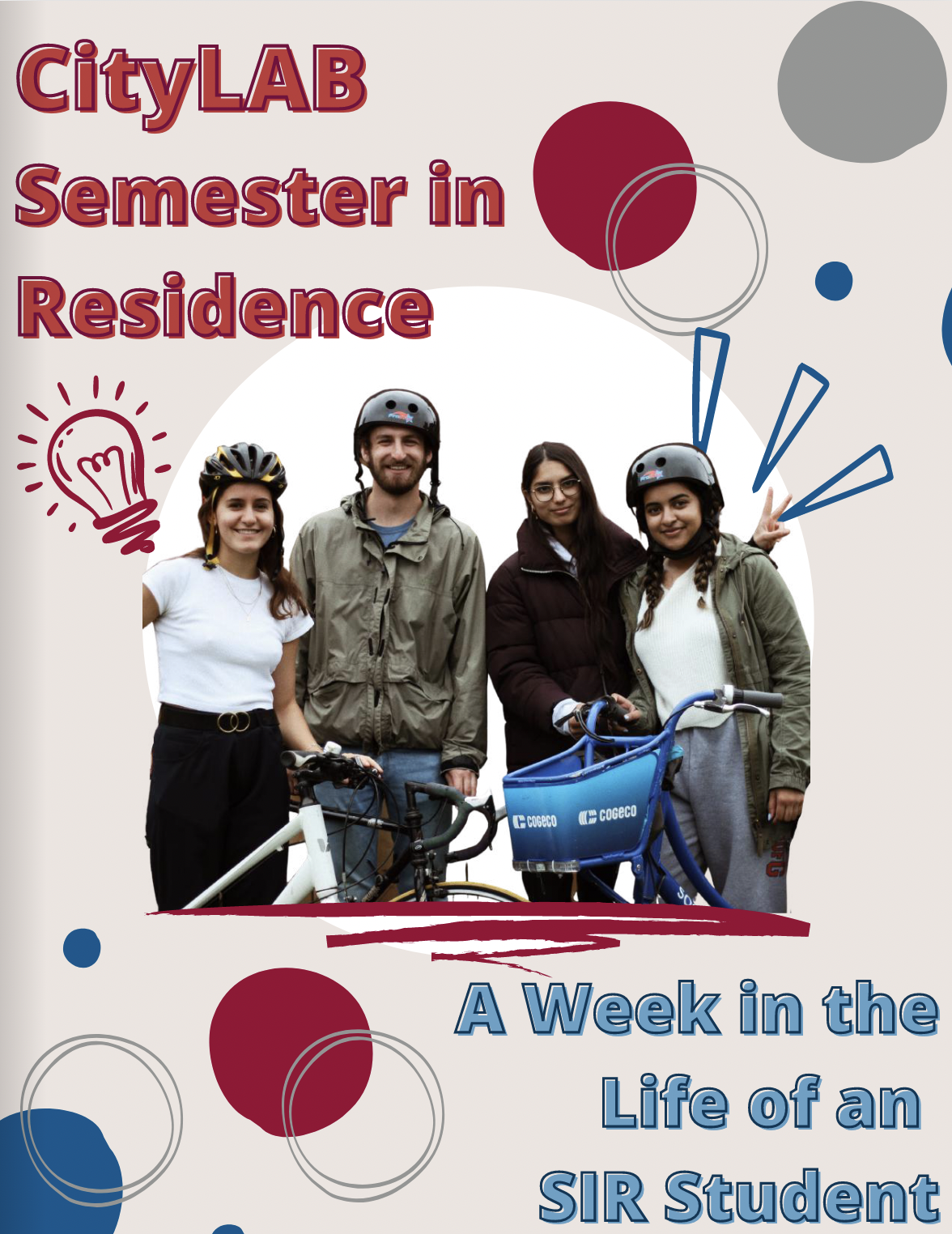
Week in the Life Magazine Read the magazine
Check out our CityLAB Ambassadors “A Week in the Life of a SIR Student” magazine.
Our fantastic CityLAB Ambassadors, Maleka El Naghi and Amandeep Saini, have created an online magazine that takes you through a week in the life of our Semester in Residence students: from classes to a visit to Tim Hortons Field to student testimonials, this magazine can help you decide if taking CityLAB Semester in Residence could be the right move for you!
Explore Further
Follow @citylabsir on Instagram! Listen Now
Follow at @CitylabSir on Twitter/X! Listen Now
Follow us on YouTube Listen Now
SIR Experience
DESIGN
In the Design component of CityLAB learn how to explain and apply design thinking principles and tools, such as User Journey Maps, to generate solutions that incorporate sustainability, resiliency, equity and cost-effectiveness goals.
At the end of the semester, students will be able to explain the structure and operations of the City of Hamilton, identify the issues and complexities facing municipalities in the provision of equitable services and safe and resilient infrastructure, and critically analyze the City’s approach to public engagement.
Design class is also an opportunity for students to meet guest speakers such as experienced urban planners and architects to learn more about the professional fields when working for the City.
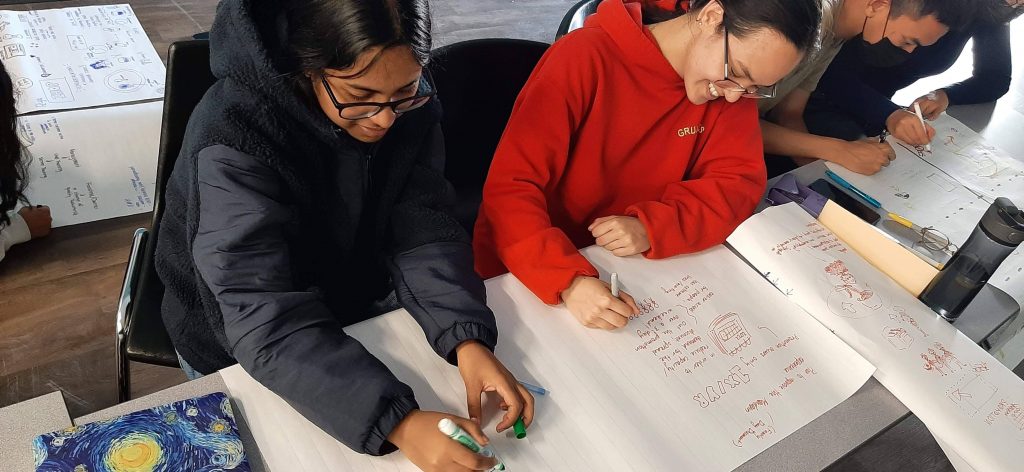
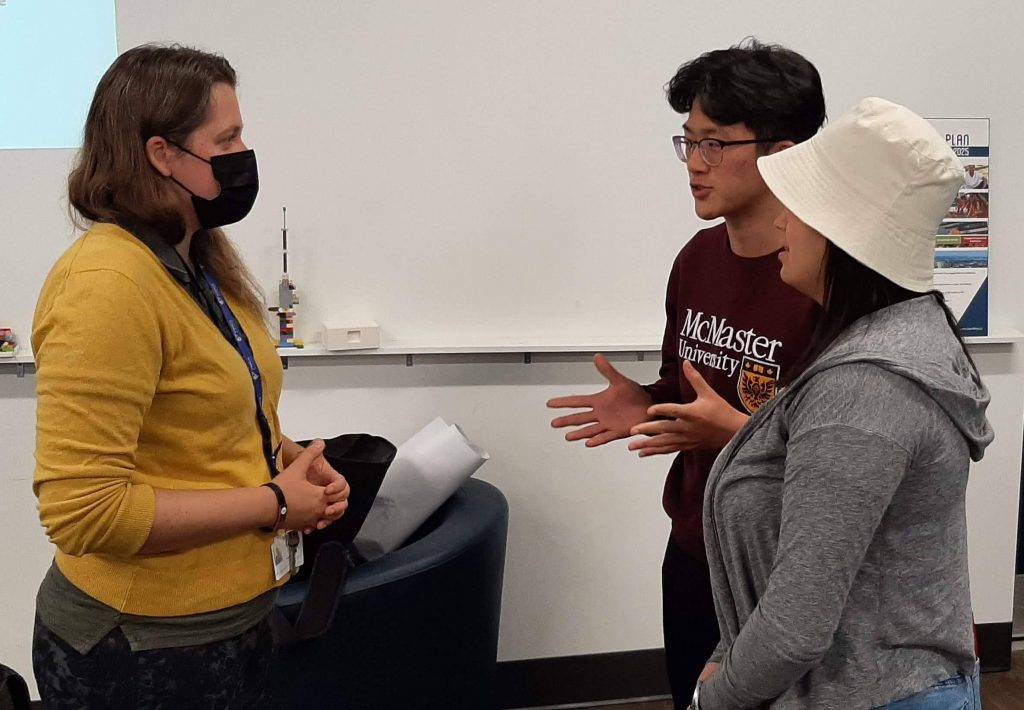
DIALOGUE
Dialogue lectures and activities guide students to learn how to successfully facilitate a dialogue between and within municipal governments, organizations, community groups, and citizens, while also developing a greater awareness and understanding of community engagement practices and skills.
PROJECT MANAGEMENT
In Project Management students collaborate with instructors, classmates, project partners, and additional stakeholders to develop an experiential learning-based project. The collaborative and complex project is an opportunity for students to apply the learnings from design, dialogue, city building, and project management to their project.
Visit our Past Projects page to explore previous CityLAB projects.
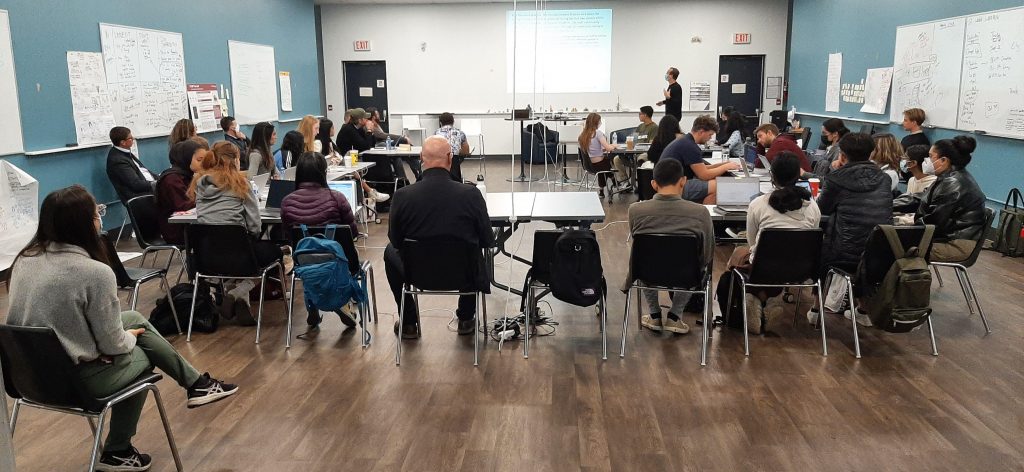
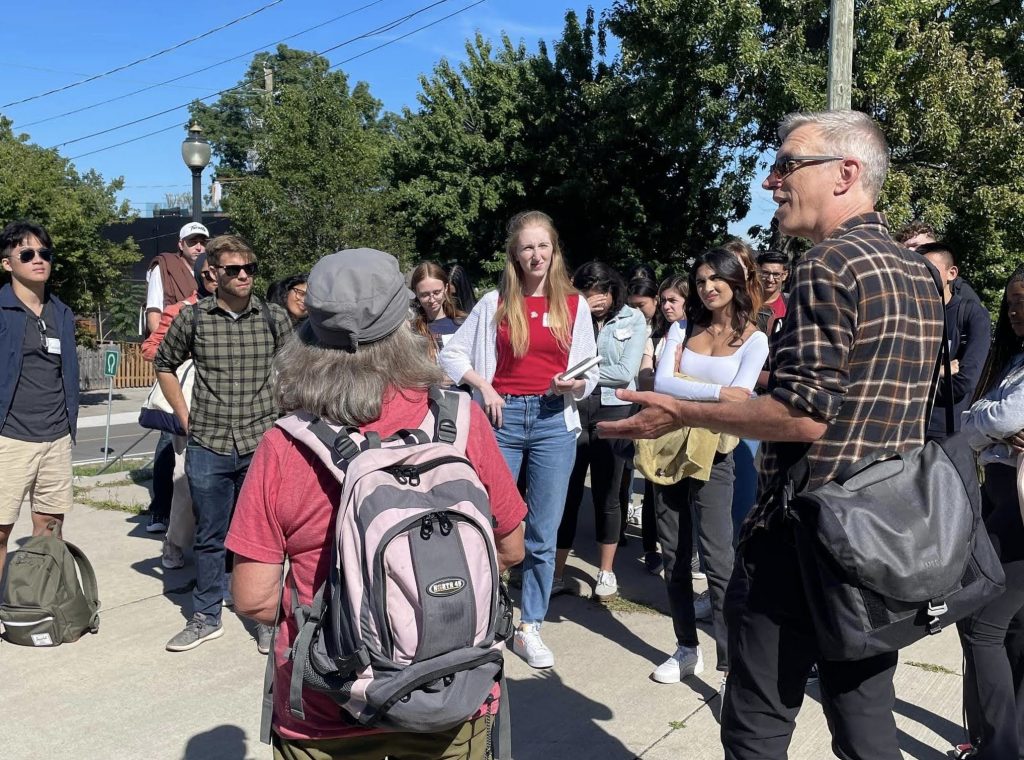
CITY BUILDING
Through field trips around Hamilton and class activities, students have the chance to explore Hamilton and identify and critique historical and ongoing systemic inequities that simultaneously both prevent and discourage certain individuals and groups from participating in the communities.
City Building also provides the opportunity for students to meet community activists, leaders, and City Councilors from various backgrounds to discuss and learn how they can take action and enact change in their local communities.
STUDENT COMMUNITY
Being a part of a tight-knit community has been one of the greatest takeaways for CityLAB students. CityLAB encourages students to get to know each other, grow strong friendships, and work together to build a warm learning environment.
Some fun activities CityLAB students get up to: Lunches at the Farmers Market, Pumpkin carving, pancake breakfasts!
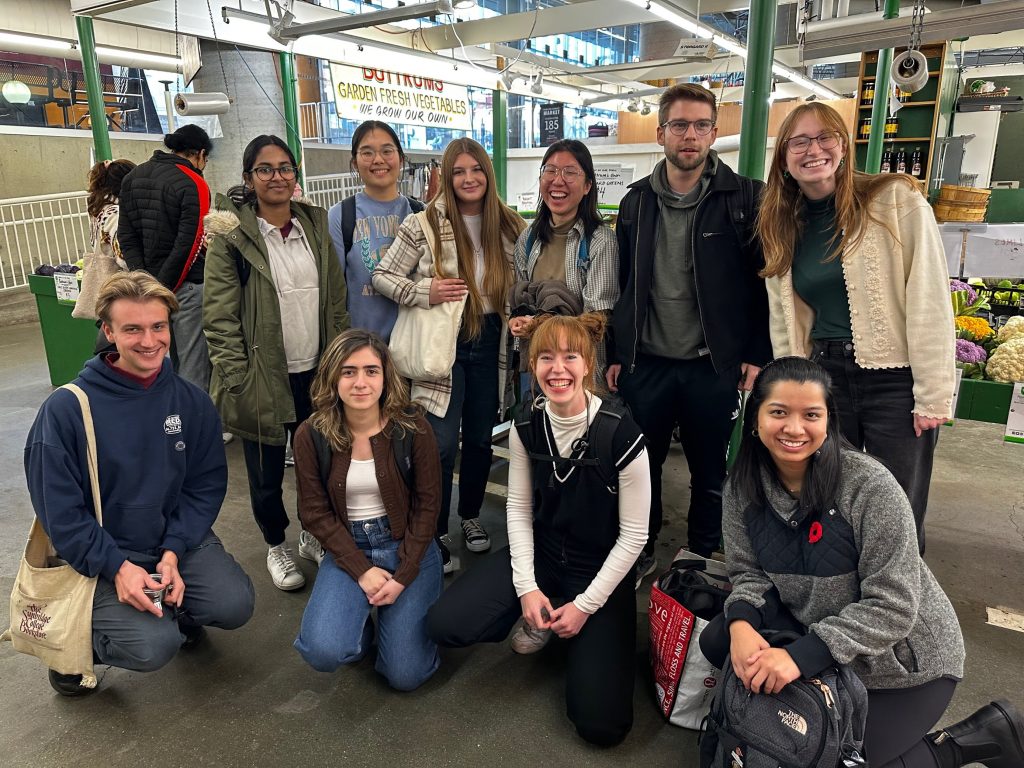
Apply – SIR
Applications for the Semester in Residence are currently closed
Waitlist applications are now open till all spots are filled Apply Now
Note: We recommend discussing how the CityLAB SIR program will fit into your course schedule and degree requirements with your academic advisor before you apply. You can also view your advisement report in Mosaic to assess if CityLAB SIR will fit into your remaining elective space.
CityLAB Semester in Residence (CMTYENGA 4A06 & 4A09) is a 15-unit course designed for passionate, motivated, and enthusiastic students. If you want to learn from the community, apply your studies to make change, and expand your personal and professional networks, then this is the course for you!
This year our theme—How might we build a climate resilient future?—asks us to bring a critical lens to our explorations, discussions, and project work. Throughout CityLAB SIR, students will work in alignment with the City of Hamilton’s new climate mitigation and adaptation and alongside leaders within the City of Hamilton and the Hamilton community to think critically about what a climate resilient future might look like in Hamilton. Upper year students from all faculties are encouraged to apply!
Phase 1 of applications deadline: May 20, 2024
Waitlist Applications:
To be considered for the 2024 SIR cohort, please apply to join our waitlist. Applications will be reviewed and accepted on a rolling basis until all program spots are filled.
CityLAB Semester in Residence – FAQs & Application

Please read through the FAQs for applying to CityLAB Semester in Residence before applying. If you have any questions, please contact Randy Kay, Outreach Director for Semester in Residence at kayrl@mcmaster.ca.
General FAQs
CityLAB SIR is an experiential opportunity that allows McMaster students to work alongside local community organizations and the City of Hamilton on real change-making projects to address social and political issues in Hamilton. The program aims to build students’ capacity in leadership, community engagement, project management, and design thinking. The CityLAB SIR program consists of two academic courses (CMTYENGA 4A06 and CMTYENGA 4A09) that are taken concurrently during the fall semester. The two courses are equivalent to a 15-unit academic semester. As such, for most students, the CityLAB SIR courses listed above are the only courses students take while participating in the program.
Please see the ‘How will two courses adding up to 15 units fit in with my schedule/program requirements?’ section for further details.
Any undergraduate student who will be enrolled in Level III and above in the upcoming fall semester is eligible. Students from all faculties and programs may apply, and there are no prerequisites to participate. This program is open to international students as well.
Everyone! CityLAB SIR is an opportunity for students of all disciplines to grow and develop their community engagement and project management skills. You don’t need prior experience in community engagement or project work. You just have to be open to listening and learning about the needs of the Hamilton community, and how to best support those impacted by the issues we address. We understand everyone has a different set of skills and experiences gained from school, work, volunteering, and life experiences, and we know each and every one of you will bring something unique to the SIR program.
If you want to:
- Make positive change,
- Explore social issues,
- Develop professional relationships,
- Build your public-speaking, communication, and active listening skills,
- And have fun…
… then CityLAB is for you!
CityLAB SIR students are expected to be available during business hours, Monday to Friday from 9 AM to 5 PM. During this time, students will be working on their projects alongside City of Hamilton staff or local community organizations. Classes and lectures are also held during this time.
A more detailed breakdown of the schedule will be developed and shared before the start of the term.
Note: We recommend discussing how the CityLAB SIR program will fit into your course schedule and degree requirements with your academic advisor before you apply. You can also view your advisement report in Mosaic to assess if CityLAB SIR will fit into your remaining elective space.
Applications for the CityLAB SIR program open in April 2023. Once we review applications, we will let you know if you have been accepted into the program before the enrollment period for the upcoming academic year opens (by mid-June).
McMaster students accepted into the program will be provided with course permission, and will be able to register as usual using Mosaic after they have been accepted. Redeemer students are encouraged to meet with Kim Lammers, Registrar (klammers@redeemer.ca) to discuss available options. Redeemer students need a 7.0 cumulative GPA (70 or B-) to be eligible. If you have difficulties with the application form, please email Randy Kay, Outreach Director for Semester in Residence at kayrl@mcmaster.ca.
At present, the CityLAB SIR program is only offered in the fall term (September to December).
City of Hamilton staff and local community organizations submit a broad range of projects and challenges for students to work on throughout the year. We work with City staff, community partners, and faculty to scope out appropriate projects for the CityLAB SIR program, and a final list of approved projects will be presented in early September. The projects will be co-created between City staff, community leaders, faculty members, and students, so they will change depending on specific interests. All projects will align with the City of Hamilton’s Strategic Priorities.
Here’s a link to past projects and final reports.
CityLAB SIR students are assigned to projects by the instructional team based on skills, interests, and to ensure interdisciplinary teams.
Planning ahead is a great idea, but the permission phase only happens as part of the application process. You will have to wait until the year you apply for the permissions process to activate.
No, participation in the CityLAB Semester in Residence (SIR) program does not involve living in a specific residence! “Semester in Residence” simply refers to the idea that you will be spending the whole fall semester participating in the program. Currently, CityLAB SIR classes take place in downtown Hamilton in the CityLAB Innovation Hub, right beside City Hall at 58 Jackson Street West.
The CityLAB SIR classroom space is located in downtown Hamilton at 58 Jackson Street West. There is access to an elevator and accessible washrooms.
Each semester, the CityLAB SIR program also organizes field trips to various parts of the city. If you require accommodations, these can be made in collaboration with CityLAB SIR faculty and staff.
For further questions regarding accessibility, please contact our Outreach Director, Randy Kay, at kayrl@mcmaster.ca.
Academic FAQS
The CityLAB SIR program consists of two academic courses (CMTYENGA 4A06 and CMTYENGA 4A09) that are taken concurrently during the fall semester. The two courses are equivalent to a 15-unit academic semester.
The CityLAB SIR courses are meant to be immersive experiences and will not necessarily fit everyone’s program requirements. Depending on your program, you may be able to use all or part of the credits towards your degree requirements. You should discuss how CityLAB SIR will fit into your degree requirements with your faculty’s academic advisor. We recommend doing so before you apply.
CMTYENGA 4A06 / CMTYENGA 4A09 cannot be taken as standalone courses; they must be taken together as a full 15-units as part of the broader CityLAB Semester in Residence program.
Overloading is possible, however, it is not recommended since the workload for the 15 units is intensive and demanding. If you want to overload, you can check with your program for approval should you wish to add a course.
Some faculties and programs allow students to use their participation in the CityLAB SIR program to fulfill the thesis requirement for their degree. If you are interested in this, consult your academic advisor to see if this is possible in your program.
There is a course outline, which is often updated after each semester. The course outline will include grading. View previous course outlines.
Our core teaching team is made up of an interdisciplinary team of educators:
- Dialogue Instructor – Darina Vasek; vasekd@mcmaster.ca
- Design Instructor – Elizabeth Bang; bange@mcmaster.ca
- Project Management Instructor – Kojo Damptey.; dampteok@mcmaster.ca
- City Building 101 – Randy Kay; kayrl@mcmaster.ca
You have some time to enroll since you are already approved to join the SIR. You can enroll any time before the start of term.
If you’ve been approved, register for both courses at the same time, for a total 15 units. If you only register for one of the courses at a time you won’t be able to enroll.
Past Projects – SIR
2023 Projects

Getting Hamilton's LRT on the Right Track Learn More
Looking at Hamilton’s LRT Project from a climate justice lens.
Looking at Hamilton's LRT Project from a climate justice lens.
Context: After years of contentious debate, in 2021, the City of Hamilton recommitted to its Light Rail Transit (LRT) project on the account of and through the funding of $3.4 billion dollars by the federal and provincial governments (Government of Ontario, 2021). This 14-kilometre LRT corridor with 17 stops will run along King Street from McMaster University to Eastgate Square, a route currently served by the 10-B Line Express HSR bus (City of Hamilton, 2023). Metrolinx, the crown corporation governing the project, has committed to providing fast, cheap and reliable transportation while ignoring the environmental and social implications the LRT will have on Hamilton and its residents. The LRT development will serve as a foundation and guideline for five future major transit projects in Hamilton, including the A-Line. Formed in 2017 in response to the opportunities presented by the Hamilton Light Rail Project, the Hamilton Community Benefits Network (HCBN) has and continues to advocate for community dialogue and social-environmental considerations around the B-Line LRT project.
Students: Diana Samanou, Griffin Kinzie, Hannah Horlings, Isabela Sipos, Kiana Craig, Simon Batusic
Staff: Karl Andrus – HCBN Community Benefits Manager
Instructors: Randy kay, Kojo Damptey, Elizabeth Bang, Darina Vasek
Read the final report here.

Unlocking Healthy Living: A Community Centric Approach Learn More
Building a Healthy Active Living: Empowering Riverdale Residents
Unlocking Healthy Living: A Community Centric Approach
Context: SCORE! is a pilot project to introduce sustainable health practices and support to low-income immigrant families, primarily those with children aged 5-11, based in the Riverdale East & West neighborhoods in Ward 5. SCORE! was formed in response to observations of obesity and type 2 diabetes (T2D) among new immigrant families in the neighbourhoods. The goal of SCORE! is to connect people to nature-based activities, healthy food systems, promote HAL and climate sustainability.
Students: Oyin Aderibgbe, Atoosa Berenji Kalkhoran, Alicia Au, Ibreez Asaria, Fatma Samatar, Zimo Wang
Instructor: Kojo Damptey, Darina Vasek, Elizabeth Bang, Randy Kay
City Staff: Patty Montague, Project Manager, SCORE!
Read the final report here.

Redefining Urban Sprawl Learn More
Addressing the gap in education surrounding densification within Hamilton.
Redefining Urban Sprawl
Context: In Hamilton, over 1900 acres of greenbelt land is at risk for urban expansion due to Bill 23. Hamilton residents and the City Council want a progressive and viable urban growth management plan to freeze our boundary and accommodate growth within our existing urban area.
Students: Vicki Yianakis, Jacob Oussoren, Hannan Minhas, Amrit Marwaha, Mo Amjad, Daniella Chukwu
Staff: Ian Borsuk (Environment Hamilton)
Instructor: Kojo Damptey, Darina, Vasek, Elizabeth Bang, Randy Kay
Read the final report here.

Climate Justice Framework for the City of Hamilton Learn More
Incorporating Climate justice into decision making.
Climate Justice Framework for the City of Hamilton
Context: The Hamilton Climate Change Impact Adaptation Plan (CCIAP) is a proactive effort to lessen the impact of climate change on Hamilton. This evidence-based strategy uses the most recent climate forecasts to protect our infrastructure, companies, and residents. The City of Hamilton’s Office of Climate Change Initiatives (OCCI) main priority is to safeguard the residents of our community using this plan, while also minimizing the expenses, duration, and negative effects on health. They seek to strengthen operations and improve community resilience in the face of environmental issues by beginning to understand diverse community viewpoints, concerns, and barriers, in order to develop a climate justice framework.
Students: Rand Al-Wazzan, Sifad Chowdhury, Tasneem Alnahhas, Ishaq Siddiqui, Dylan Yu
Staff: Trevor Imhoff -Senior Project Manager, Beatrice Ekoko – Project Manager
Instructor: Kojo Damptey, Darina Vasek, Elizabeth Bang, Randy Kay
Read the final report here.

Active Transportation - Hamilton by Bike Learn More
A revamp of Hamilton’s cycling routes for renewed cycling enthusiasm.
Active Transportation - Hamilton by Bike
Context: While cycling conditions in Hamilton have improved greatly
over the last decade, the city has failed to properly promote
cycling in the community. The city’s official website includes
trails that are out-of-date, clunky, and missing important
information. The last update occurred in 2006, prior to much
of the current biking infrastructure. In almost 20 years,
demographics and the city itself have changed dramatically,
requiring a similar change in the biking information currently
available.
Students: Adam Locke, Esther Kok, Fatima Hameed, Madhura Kadam, Ramona Ribaudo-Begin
City Staff: Rachel Johnson, Cairan Egan
Instructors: Randy Kay, Elizabeth bang, Kojo Damptey, Darina Vasek
Read the final report here.

Protecting Tenants from Extreme Heat Learn More
Amending Municipal Law to Protect the Right to Health and Safety
Protecting Tenants from Extreme Heat
Context: Between 2051-2080, it is estimated that 60 days annually
will be over 30 degrees. As heatwaves become more
regular, tenants without reliable access to cooling are left
at higher risk of heat-related death and illness. Currently,
there is no maximum heat by-law in Hamilton amidst the
ever-increasing summer temperatures. ACORN Hamilton
advocates for the interests of low to moderate-income
tenants; the most pertinent being the sweltering
temperatures in their units. Unfortunately, many landlords
prioritize profits over the health and well-being of their
tenants, add AC-related fees, raise costs, and suggest
impractical solutions such as moving.
Students: Helena Orteza, Alex Phelps, Ayesha Manal, Surbhi Rao, Victoria Cuthbert
Project Advisors: Olivia O’Connor – Head Organizer for Hamilton ACORN
Instructors: Randy Kay, Kojo Damptey, Elizabeth Bang, Darina Vasek
Read the final report here.
2022 Projects

Addressing Hamilton’s Housing Crisis Learn More
Through the Lens of Market Home Rentals and Market Homeownership
Addressing Hamilton’s Housing Crisis
Context: This project is interested in solutions targeting the market home rentals and market homeownership aspects of the continuum. The project commenced by orienting to the housing continuum and understanding the pinch points that exist throughout in order to inform the project’s foundational knowledge of housing issues in the city, realizing that parts of the housing continuum do not operate in isolation –– both the problems and potential solutions. The findings that surfaced were thematized to encapsulate major issues related to housing in Hamilton as expressed by the various community stakeholders the team engaged.
- Protecting tenants ensures the security and stability of the market home rental landscape for residents.
- Additions to the available housing supply may not always require new housing development.
- The evolving demographics and current realities of the Hamilton housing market are important to recognize.
- Maintaining the status quo is needed to prevent regression down the housing continuum, but also requires active effort.
- Housing, as a basic human necessity, has become increasingly commodified.
Student Team: Kenneth Chen, Riya Patel, Eden Pang, Nivethinie Sivakumar, and Lesha Shah
Faculty: Dave Heidebrecht, Darina Vasek, Elizabeth Bang and Randy Kay
Read the final report here.
Watch the project video and infographic here.
Market Rental Housing
Context: This project was centred on exploring the issues that Hamilton tenants face in the rental marketplace. Today, renters in Hamilton are unable to afford housing due to increasing living costs and low wages. With increasing rent prices over the last few years and a lack of security because of “renovictions” and informal evictions, residents are struggling to find affordable and suitable housing. Tenants are also experiencing difficulty moving up the housing continuum and are instead regressing backwards. Another important component of market rental housing is student housing. Within Hamilton, students are experiencing difficulty finding affordable and adequate housing. Students are not provided with sufficient education on navigating landlord-tenant relations, tenant rights, and the overall leasing process. Altogether, these issues point to a gap in market rental housing that must be addressed. With this in mind, the market rental housing group was tasked with consulting community stakeholders and providing recommendations to the City of Hamilton on strategies to improve market rental housing.
Student Team: Aveena Sriharan, Noor AL Omran, Jazz Walia, Val Flores & Ericka Hamilton
Faculty: Dave Heidebrecht, Darina Vasek, Elizabeth Bang and Randy Kay
Read the final report here.

Unlocking Municipal Land Learn More
Exploring Tools for Affordable Housing in the City of Hamilton
Unlocking Municipal Land
Context: The cost of living has dramatically increased in Hamilton. Hamilton is now one of the least affordable North American cities to live in. Community partners, academics, and City Staff agree that a lack of supply, as well as zoning, funding, resource, and collaboration issues make affordable housing a complex and multi-level problem. In this report, we outline the scope of our work from the semester and dive into our exploration process, community consultations, findings, and recommendations. Research and consultations with stakeholders have identified a need for the city to build a renewal strategy for revitalizing and developing on municipal owned land that identifies:
- Mechanisms that ensure affordability and sustainability of housing such as specific affordability and development regulations
- Policy goals and City levers to build affordable housing on municipal land effectively
- Coordination of external and internal partnerships and collaboration
- Ways to engage with the community throughout the planning and development process
Student Team: Anastasija Zecevic, Bohmee Kim, Maryam Sheikh, Rachel Long, Rhea Saini
Faculty: Dave Heidebrecht, Darina Vasek, Elizabeth Bang and Randy Kay
Read the final report here.
Breaking the Loop
Context: In the City of Hamilton (CoH), many tenants report that their rent takes up a majority of their income, while they struggle to pay remaining non-housing expenditures. This is the result of Hamilton’s lack of affordable rental stock. There are many gaps in existing municipal policies that hinder the production and maintenance of affordable rentals in the city. The CoH recognizes these issues in Hamilton as they have committed to implementing a Housing Sustainability and Investment Roadmap (HSIR). This semester, CityLAB is contributing to the CoH’s HSIR by conducting research through engagement with diverse stakeholders. Our group’s project centers on affordable rentals. Throughout numerous conversations with City staff, community organizations, and organizations representing the private sector, our team has determined three key reasons for Hamilton’s shortage of affordable rentals: (1) the loss of existing affordable stock due to reno- and demovictions, and vacancy decontrol, (2) the high costs of building and developing new stock, and (3) the financialization of housing.
Student Team: Anne Tinio, Bianca Magdalinis, Eunice Tunggal, Ivan Kredl, Lucas Holler
Faculty: Dave Heidebrecht, Darina Vasek, Elizabeth Bang and Randy Kay
Read the final report here.
Community Housing
Context: The onset of the COVID-19 pandemic in 2020 impacted individuals in all sections of the housing continuum, such as negatively affecting people’s income stability. However, these impacts had disproportionate consequences for individuals on the left end of the housing continuum. Specifically, the high level of uncertainty and lack of stability led to lost jobs and lower wages for members of low-income and vulnerable communities. From September 6, 2022, to December 8, 2022, a group of five McMaster students, Kundan Ahluwalia, Elza Joji, Shauna Ko, Fiona Sharpe and Ritika Sudan worked with CityLAB instructors and various stakeholders to discover the needs, concerns, and future plans for Hamilton’s community housing sector, which resulted in the proposal of a few recommendations to the currently developing HSIR. While the Project Group aims to advance HSIR, it also aligns with the City of Hamilton’s Strategic Priorities (2016-2025), primarily, Healthy & Safe Communities, Built Environment & Infrastructure and Culture & Diversity. The Project Group believes that there needs to be a long-term solution to address the lack of affordable and accessible housing in the City of Hamilton.
Student Team: Kundan Ahluwalia, Elza Joji, Shauna Ko, Fiona Sharpe, Ritika Sudan
Faculty: Dave Heidebrecht, Darina Vasek, Elizabeth Bang and Randy Kay
Read the final report here.

Transitional Housing and Housing Services Provision Learn More
Precarious to Stable Housing
Transitional Housing and Housing Services Provision
The City of Hamilton is experiencing a housing crisis that has been exacerbated by effects of the COVID-19 pandemic. Housing affordability in Hamilton continues to decrease, while homelessness is increasing. Altogether, these effects have led to an unhealthy housing continuum. Transitional housing occupies an uncertain place within the housing continuum and Hamilton’s homelessness strategy going forward. The City, province and federal government have adopted a Housing First approach to combat homelessness that aims to place people experiencing homelessness into affordable or market rentals or community housing. Our group aims to understand the current state of transitional housing and adjacent services, what is going well, and gaps and barriers that are being faced by service providers.
Student Team: Alexandria Gonzales Daniel Majik, Nate Steeves Sneha Mukherjee, Zeynep Yilmaz
Faculty: Dave Heidebrecht, Darina Vasek, Elizabeth Bang and Randy Kay
Read the final report here.
Watch the project video here.
View the project infographic here.
2021 Projects

Cycling Towards Improved Public Engagement Learn More
Exploring Sustainable Mobility & Cycling Infrastructure
Cycling Towards Improved Public Engagement
Context: At the end of September 2021, the Cycling Infrastructure Project Team (the CITeam) began working with Peter Topalovic and Trevor Jenkins of the Sustainable Mobility Program, who brought forth the objective of improving Sustainable Mobility’s public engagement for cycling infrastructure projects. Together, both groups developed the primary objective of the project: to develop a standardized approach to Sustainable Mobility’s cycling infrastructure engagement in a manner that is directly informed by stakeholders. During the semester, the CITeam developed three main deliverables for the City of Hamilton, specifically:
- A Virtual Engagement Session: A virtual community dialogue hosted on with the purpose of gathering feedback from stakeholders on both Sustainable Mobility’s past engagement processes and the CITeam’s novel development of the Classification System
- A Ride-Along Event: An in-person interactive cycling tour with the purpose of gathering feedback on both the physical cycling infrastructure and also determining the effectiveness of the Ride-Along as a form of engagement.
- The Classification System: A systematic approach to cycling infrastructure public engagement in which certain infrastructure characteristics are classed according to stakeholder impact, therefore warranting different levels of public engagement. The system was delivered to the city as a five-page infographic.
Student Team: Nico Belanger, Wajeeha Cheema, Sophie Gordon, Falisha Razack
Project Partner: Trevor Jenkins & Peter Topalovic (Project Managers, Smart Commute, City of Hamilton)
Faculty: Dave Heidebrecht, John Maclachlan, Darina Vasek, and Randy Kay
Read the final report here.

Building a Sustainable Hamilton Learn More
Promoting Green Development Standards in Hamilton Through an EDI Framework
Building a Sustainable Hamilton
Context: At the start of the project, it was believed that there was no progress concerning Green Development Standards (GDS) in Hamilton. However, after several informational interviews, the student team discovered that the city is considering GDS for low-density developments, and there has been consultation with the development industry. The student team identified this as an opportunity to raise public awareness of GDS and to include diverse stakeholders in GDS policy design. This understanding was premised by the Design course learnings that address the complexity embedded in urban planning and city-level decision-making processes. The student team facilitated a community dialogue event with developers, community organizations, and city staff to broaden the breadth of consultation of GDS and gather ideas about what an inclusive GDS in Hamilton might look like. Ultimately, the goal of the GDS project evolved to inform better GDS policy that considers Equity, Diversity, and Inclusion (EDI) principles. This project is aligned with the City of Hamilton’s Corporate Climate Change Goals 1) buildings; 2) climate adaptation; and 8) Diversity, Health, and Inclusion.
Student Team: Sahra Siyad, Kazza Topp-Nguyen, Mehak Kapur, Jasmine Devine, Maleka El Naghi
Project Partner: Lynda Lukasik (Executive Director, Environment Hamilton); Brody Robinmeyer (Project Manager, Friendly Streets for Black, Indigenous & Racialized Communities, Environment Hamilton)
Faculty: Dave Heidebrecht, John Maclachlan, Darina Vasek, and Randy Kay
Read the final report here.
View the project video and infographic here.
Who’s Voting?
Context: The overall goal of the project was to increase participation in the upcoming 2022 municipal election. To achieve these goals, the Municipal Elections Group undertook a two-part research project which involved: (1) a demographic data analysis to identify who is and who is not voting in Hamilton’s municipal elections, and (2) focus groups to understand barriers and co-create strategies to increase engagement among one specific demographic group—youth. These components led to a presentation to the City’s Elections Team and the creation of a recommendations report that was provided to the City of Hamilton, with the hopes that these recommendations will be implemented to make the municipal elections process more inclusive and accessible.
Student Team: Milica Hinic, Sharon Lim, Megan Marsh, Muntaka Siddique, Vithuyan Sugumar
Project Partner: Conor Flood & Tammy Reeves (Coordinators, Elections, City of Hamilton); Aine Leadbetter (Manager, Elections & Print/Mail)
Faculty: Dave Heidebrecht, John Maclachlan, Darina Vasek, and Randy Kay
Read the final report here.
View the project video and infographic here.
LRT, For the Community
Context: The Hamilton LRT is a planned transit line in Hamilton, Ontario spanning 14 kilometers from McMaster University to Eastgate Square and was approved by Hamilton’s City Council on 15 September 2021. The LRT is a major public infrastructure project and will have varying impacts on different communities and residents across the city. For this reason, it is important that residents are engaged in the planning and design of the LRT. CityLAB SIR partnered with HCBN to support and further its goals in developing a CBA with Metrolinx, the City of Hamilton, and the local community. More specifically, the CityLAB Project Group helped to conduct community-based research through virtual dialogue events on what community benefits residents would like to see included in the agreement and developed a recommendations report summarizing key findings and suggested next steps for the project. The group also developed an event template for the HCBN to guide future virtual dialogue events, which is based on the cost-free model of the events hosted this semester. The CityLAB Project Group also refined an existing HCBN survey which seeks to provide another avenue for residents to share their feedback and ideas on LRT community benefits.
Student Team: Amandeep Saini, Mirjana Poljak, Tom Parapilly, Mahek Shergill
Project Partner: Karl Andrus (Community Benefits Manager, Hamilton Community Benefits Network); Koubra Haggar (Lead Organizer, Hamilton Community Benefits Network)
Faculty: Dave Heidebrecht, John Maclachlan, Darina Vasek, and Randy Kay
Read the final report here.
2020 Projects
Complete Street Intersection Makeover Project
Context: The Complete Streets Intersection Makeover Project (CSIMP) Team collaborated with Hamilton Sustainable Mobility City staff and the Ward 1 Office to achieve the overarching goal of informing Ward 1 residents about Complete Streets design and to facilitate a meaningful virtual community engagement event that gathered community input about redesigning intersections in Hamilton’s Ward 1 community. The work of the CSIMP Team aligned with several of the City of Hamilton’s Strategic Priorities, including: (1) Community Engagement and Participation, (3) Healthy and Safe Communities, (4) Clean and Green, and (5) Built Environment and Infrastructure (City of Hamilton, 2017). The report will be used by City staff and the Ward 1 councilor to continue the Complete Streets Intersection Makeover project and to inform further work on Complete Streets intersection projects in other Wards and other Cities.
Student Team: Foram Patel, Julia Menezes, Tanisha Palmer, Sarnti Sornpaisarn
Project Partners: Cindy Mutch (Senior Project Manager, Community Engagement)
Project Partners: Rachel Johnson (Project Manager, Sustainable Mobility) and Peter Topalovic (Project and Program Manager, Sustainable Mobility)
Faculty: Dave Heidebrecht, Brian Baetz, Darina Vasek, Randy Kay
Read the full report here.

Amplifying Engage Hamilton Learn More
Enhancing Public Engagement in Hamilton through the Engage Hamilton Platform
Amplifying Engage Hamilton
Context: In June 2020, Engage Hamilton (EH), an online platform was launched that was meant to compliment the different engagement tools and strategies the City of Hamilton uses to promote greater public engagement and make it easier for residents to participate in civic activities. However, due to the COVID-19 pandemic, the platform has become the main source of public engagement, instead of being used as a complementary tool. This is due to the COVID-19 restrictions that were imposed by various levels of government which meant that all in-person public engagement had to be placed on hold in order to prevent the spread of the virus. This has prompted the city to host all public engagement activities online instead. implementation. For the project, CityLAB students collaborated with City partner Cindy Mutch to create interactive and creative seasonal community-building projects to help build the online community on the Engage Hamilton platform as well as increase the platform’s database.
Student Team: Adam Chojecki, Maheen Shahid, Divya Tamilselvan, Zoe Ullyett
Project Partners: Cindy Mutch (Senior Project Manager, Community Engagement)
Faculty: Dave Heidebrecht, Brian Baetz, Darina Vasek, Randy Kay
Read the full report here.

Reconnecting Neighbourhoods Amidst COVID-19 Learn More
Exploring how the City of Hamilton can best Re-Establish Community Engagement that has been Lost during the Pandemic
Reconnecting Neighbourhoods Amidst COVID-19
Context: The City of Hamilton regards community engagement and participation as an important municipal priority. The City hopes to collaboratively build a sense of community through transparency, accessibility, and public participation. For many years, this goal has been driven forward by the work of the Neighbourhood Development Section (NDS), formerly known as the Neighbourhood Action Strategy. The NDS works with communities to support resident-led initiatives and help make Hamilton more connected. The recent COVID-19 pandemic has brought the work of the NDS to a halt as a result of the re-deployment of their staff and an inability to host their usual in-person events. For this project, the NDS partnered with a team of students at CityLAB Hamilton, to tackle this issue and develop recommendations regarding how the NDS should re-connect with residents and effectively support community organizations.
Student Team: Blessing Akinniranye, Harshul Bhanjana, Rebecca Gysbers, Saud Haseeb, Maryam Taj
Project Partners: Al Fletcher (Manager Neighbourhood Development, Healthy and Safe Communities)
Faculty: Dave Heidebrecht, Brian Baetz, Darina Vasek, Randy Kay
Read the full report here.

Building Climate Resilience Learn More
Preventing Disastrous Climate Change Consequences for the Future of Hamilton’s Community
Building Climate Resilience
Context: After the declaration of a climate emergency in March of 2019, the City’s challenge now is to determine Hamilton’s climate priorities and strategize actions to create a green future, one in which Hamiltonians are ready for the impacts of climate change. The primary aim of this project was to develop a list of sustainability and community engagement recommendations that can be applied to Public Works’ Climate Resiliency Strategy, which is set to be implemented beginning in 2021. To achieve this, students worked with Arlen Lemming (Senior Project Manager, Public Works) to investigate: (1) Current sustainability actions implemented in the climate plans of other municipalities, as well as an assessment of these actions’ measured/projected benefits; and (2) Hamilton’s sustainability/climate context (strengths, needs, opportunities). At the end of the project, students organized interviews with global climate leaders and directors of Hamilton’s NPOs; a website prototype of an online engagement tool for residents; a comprehensive final report including recommendations for the Public Works’ Climate Resiliency Strategy for City staff.
Student Team: Ananya Yadav, Derya Demirci, Henery Challen, Wendy Zhang
Project Partners: Arlen Leeming (Senior Project Manager, Public Works)
Faculty: Dave Heidebrecht, Brian Baetz, Darina Vasek, Randy Kay
Read the full report here.
View the project video and infographic here.

Knocking it Out of the Park Learn More
Developing an Engagement Strategy for the Hamilton Parks Master Plan
Knocking it Out of the Park
Context: The City of Hamilton currently lacks an overarching parkland design and acquisition strategy. As a result, reactionary land purchases have caused an imbalance in the location of parks, and who they have been designed for. Additionally, ever-changing requirements for sports facilities need to be considered city-wide to determine if there is an adequate supply of community sports parks. These problems are exacerbated by urban intensification. Thus, in order to ensure equitable access for all Hamiltonians, the City needs a more strategic approach; a Parks Master Plan. The focus of the Parks Master Pre-Plan project is to provide an engagement strategy that is accessible, wide-ranged and supportive of the City of Hamilton’s vision to creating a sustainable recreational parks network. In alignment with the City’s Vision “To be the best place to raise a child and age successfully”, the Parks Master Plan’s vision is to make Hamilton a better place for everyone and support residents through all of life’s stages (City of Hamilton, 2018, p.2). The CityLAB student group began collaborating with the Department of Landscape Architecture on the Parks Master Pre-Plan in October 2020 under the guidance of Cynthia Graham and John Vandriel. The CityLAB student group joined the project in the pre-plan phase and were tasked with investigating and developing an engagement strategy that the City of Hamilton can use to gauge the park-needs of its community members.
Student Team: Graeme Fishman, Sage Hartmann, Clare Mcgall, Stephanie Wang
Project Partners: Cynthia Graham (Manager of Lanscape Architectural Services) and John Vandriel (Landscape Architect)
Faculty: Dave Heidebrecht, Brian Baetz, Darina Vasek, Randy Kay
Read the final report here.
2019 Projects

Ready, Whatever the Weather Learn More
Preparing Hamilton for Extreme Weather Caused by Climate Change to build a resilient community
Ready, Whatever the Weather
Context: In March 2019, the City of Hamilton declared a climate change emergency. This declaration was in recognition of the need to address climate change on a municipal and neighbourhood level. Environment Hamilton (EH) is a local non-profit that both advocates for municipal-level responses to climate change and community building to adapt to and mitigate the effects of climate change. In service of their efforts in Hamilton communities, EH has established the Climate Ready Hamilton (CRH) network. The focus of this collaborative project was to build neighbourhood resilience to extreme weather and ensure that residents of Hamilton neighbourhoods are prepared for the adverse effects of climate change. The project looked at developing an asset map that highlighted resiliency hubs in the Beasley neighbourhood and further the CRH network. The CRH mission aligns with the City of Hamilton’s 2016-2025 strategic themes of healthy and safe communities; clean and green; and built environment and infrastructure. CRH contributes to the City of Hamilton’s goal of being the best place to raise a child and age successfully.
Student Team: Suffia Malik, Daniella Mikanovsky, Deepak Palanichimi, Jermey Swenauth, and Claire de Souza
Project Partners: Lynda Lukasik Ph.D (Executive Director, Environment Hamilton), Beatrice Ekoko (Senior Project Manager, Environment Hamilton), Trevor Imhooff B.E.S (Senior Project Manager Air Quality and Climate Change, City of Hamilton)
Read the full report here.

Community Art Learn More
Creating a Community Art Toolkit to practice community art in Hamilton
Community Art
Context: The creation of the Art in Public Places policy, including a chapter on community art, is in line with the City’s strategic plan and will allow Hamilton to create a culture of community engagement, participation, economic prosperity and growth, and healthy and safe communities among other benefits. Creating this encompassing policy can foster placemaking and holds the potential to lead the way for art to be used throughout Hamilton. This project was intended to refine the Art in Public Places policy chapter relating to community art through various community engagement methods, data collection and analysis, and ultimately the creation of a toolkit in collaboration with City Partners. The Community Art Toolkit serves as a how-to guide for people interested in practicing community art in Hamilton, which will encourage its continued creation.
Student Team: Salo Rodriguez Solarte, Hannah Lobb, Ada Zhu, Gurvir Chana, Ameya Nair
Project Partners: Ken Coit (Manager of Placemaking, Public Art and Projects), Jen Anisef (Cultural Project Specialist, Placemaking, Public Art and Projects)
Read the full report here.

Cootes Paradise Greenway Loop Learn More
Developing an active transportation network of multi-use trails around Cootes Paradise
Cootes Paradise Greenway Loop
Context: From October to December of 2019, a team of five CityLAB SIR students have worked in partnership with representatives from the City of Hamilton and the Hamilton Burlington Trails Council (HBTC) on the early stages of the Cootes Paradise Greenway Loop project. A Greenway is an outdoor active transportation network consisting of multi-use paths, pedestrian walkways, and on-street cycling facilities for both commuter and recreational use. Recreational greenways can be networks of trails linking water-based recreational sites and areas. These trails and routes often have a scenic quality as they pass through diverse and visually significant landscapes. The recreation focus may be on urban or rural areas and the scale may be local, regional, national or international. On a broad scale, this greenway concept has been proposed to serve and connect residents and visitors of Hamilton and Burlington. It has been determined that the first step to achieve the broader Hamilton-Burlington Regional Greenway is to surround the Cootes EcoPark system with a greenway of its own. This project primarily fulfills the City of Hamilton’s strategic priorities of “Clean and Green” and “Built Environment and Infrastructure”. The project report outlines a strategy to implement a greenway around Cootes Paradise and is a comprehensive review of the work that was completed by the Cootes Greenway project group with recommendations for the project’s next steps.
Student Team: Elizabeth Marr, Nicholas Leslie, Saadiya Pathan, Albert Mac, and Eleni McGowans
Project Partners: Daryl Bender (Project Manager, Active Transportation Planning and Economic Development), Jessica Brommer (Project Manager, Landscape Architectural Services, Public Works, Environmental Services), Wayne Terryberry (coordinator of Outdoor Recreation and Natural Lands McMaster University, President of the Ontario Trails Council)
Faculty: Dave Heidebrecht, Brian Baetz, Anna Marie Pietrantonio
Read the full report here.

Minimum Grid Maximum Potential Learn More
Determining What Constitutes a Connected Cycling Network for Hamilton
Minimum Grid Maximum Potential
Context: With an increased emphasis on active transportation being pertinent to future mobility solutions across the globe, cycling has come to the forefront of future development. In the most recent Transportation Master Plan of Hamilton, cycling was determined to be a vital aspect of future strides towards sustainable mobility. Hamilton currently has been developing a network of cycling infrastructure that is ever growing. With the help of Social Bicycles (SOBI), cycling has been made an even more accessible mode of transportation. Moreover, as the city has declared a Climate Emergency, Hamilton has had an interest in increasing cycle-based transportation through creating a Minimum Grid network. The goal of this project was to inform future change within the existing cycling network to increase accessibility for all ages and abilities through community engagement.
Student Team: Deborah Quist, Gabriella Christopher, Hannah Stoesz, Maryam Rana, Parsa Ayani, Tad Moretti
Project Partners: Rachel Johnson (Project Manager, Sustainable Mobility), Peter Topalovic (Project Manager, Sustainable Mobility)
Faculty: Dave Heidebrecht, Brian Baetz, Anna Marie Pietrantonio
Read the full report here.

Prepare for Tomorrow, Today! Learn More
Building a Sustainable Neighbourhood Action Plan (SNAP)
Prepare for Tomorrow, Today!
Context: This project was undertaken in order to support the City of Hamilton in preparing for a successful pilot implementation of the Sustainable Neighbourhood Action Plan (SNAP) program within the North End neighbourhood in Hamilton, Ontario. By following the three-phase SNAP framework developed by the Toronto Region Conservation Authority (TRCA), this project aims to develop the preliminary research necessary for creating comprehensive community-level climate mitigation and adaptation strategies. Specifically, this project focuses on phase one of the framework, which is intended to develop an understanding of local issues and identify stakeholders within the community. Data collection through the use of preliminary surveys and relationship-building with stakeholders is a key component of the initial phase. The focus of the report supports the work done within the initial phase of the project, seen through background research of the target neighbourhood, taking into account previous and ongoing development in the North End. To learn more about the project, the report outlines the preliminary survey, key stakeholders, and asset identification.
Student Team: Hannah Lobb, Elizabeth-Anne Marr, Ameya Nair, Albert Mac, Nicole Graziano, Sam Patrick, Deepak Palanichami, Saadiya Pathan, Abigail Laulman, Frank Liang, Paerhati Najiman, Taylor DeCoste
Project Partners: Trevor Imhoff (Senior Project Manager, Air Quality and Climate Change), Andrea McDowell (Project Manager, Air Quality and Climate Change), Adam Watson (Project Manager, Healthy and Safe Communities)
Faculty: Dave Heidebrecht, Brian Baetz, Anna Marie Pietrantonio
Read the full report here.
Course Outlines – SIR
Information Box Group
CMTYENGA 4A06 – DESIGN AND DALOGUE INQUIRY
CityLAB Semester in Residence is a project-based experiential program where students work in interdisciplinary teams mentored by staff from the City of Hamilton and local community organizations, as well as course instructors, to address real challenges affecting communities in Hamilton. CMTYENGA 4A06 is one of the two mandatory courses part of CityLAB SIR.
Using an inquiry model and drawing on an associated city-identified challenge, this course develops disciplinary capabilities in design thinking and dialogue to promote effective change-making. Below are examples of questions explored in both the design and dialogue sections of this course.
Design:
- How can we construct a physically accessible city?
- What is the value of community assets, such as sports stadiums or public parks, from an economic, social or health perspective?
- How can we design cities to address the ongoing housing crises?
Dialogue:
- How can we develop cultural humility?
- How can we establish trust, and create spaces for effective discourse?
- What are the best practices for engaging in public communication to reach underrepresented groups?
Six hours; One term
Co-requisite(s): CMTYENGA 4A09
Prerequisite(s): Registration in Level III or IV.
CMTYENGA 4A09 – APPLIED PROJECT EXPERIENCE
CityLAB Semester in Residence is a project-based experiential program where students work in interdisciplinary teams mentored by staff from the City of Hamilton and local community organizations, as well as course instructors, to address real challenges affecting communities in Hamilton. CMTYENGA 4A09 is one of the two mandatory courses part of CityLAB SIR.
Using an inquiry model and drawing on an associated city-identified challenge, this course develops disciplinary capabilities in project management to promote effective change-making. Below are examples of questions explored in this course:
- How can we effectively plan and execute significant community building or city planning projects?
- How can we build relationships and engage with stakeholders to prioritize reciprocity and equity in change-making initiatives?
- How do we create room for differing views in team settings?
Six hours; One term
Co-requisite(s): CMTYENGA 4A06
Prerequisite(s): Registration in Level III or IV
COURSE OUTLINES
Semester at CityLAB is composed of both CMTYENGA 4A06 – Design and Dialogue Inquiry and CMTYENGA 4A09 – Applied Project Experience. Both courses must be taken as co-requisites.
View previous course outlines here.

